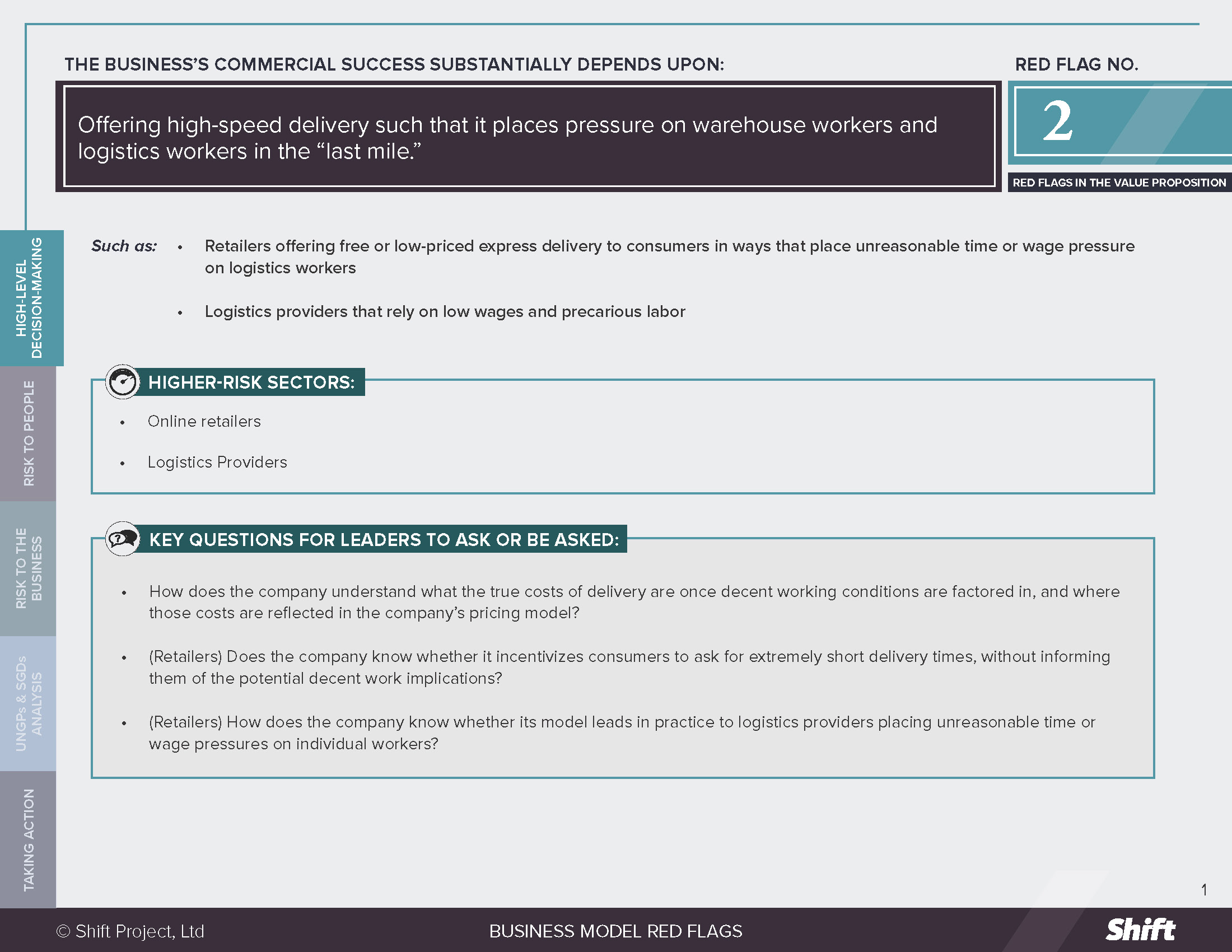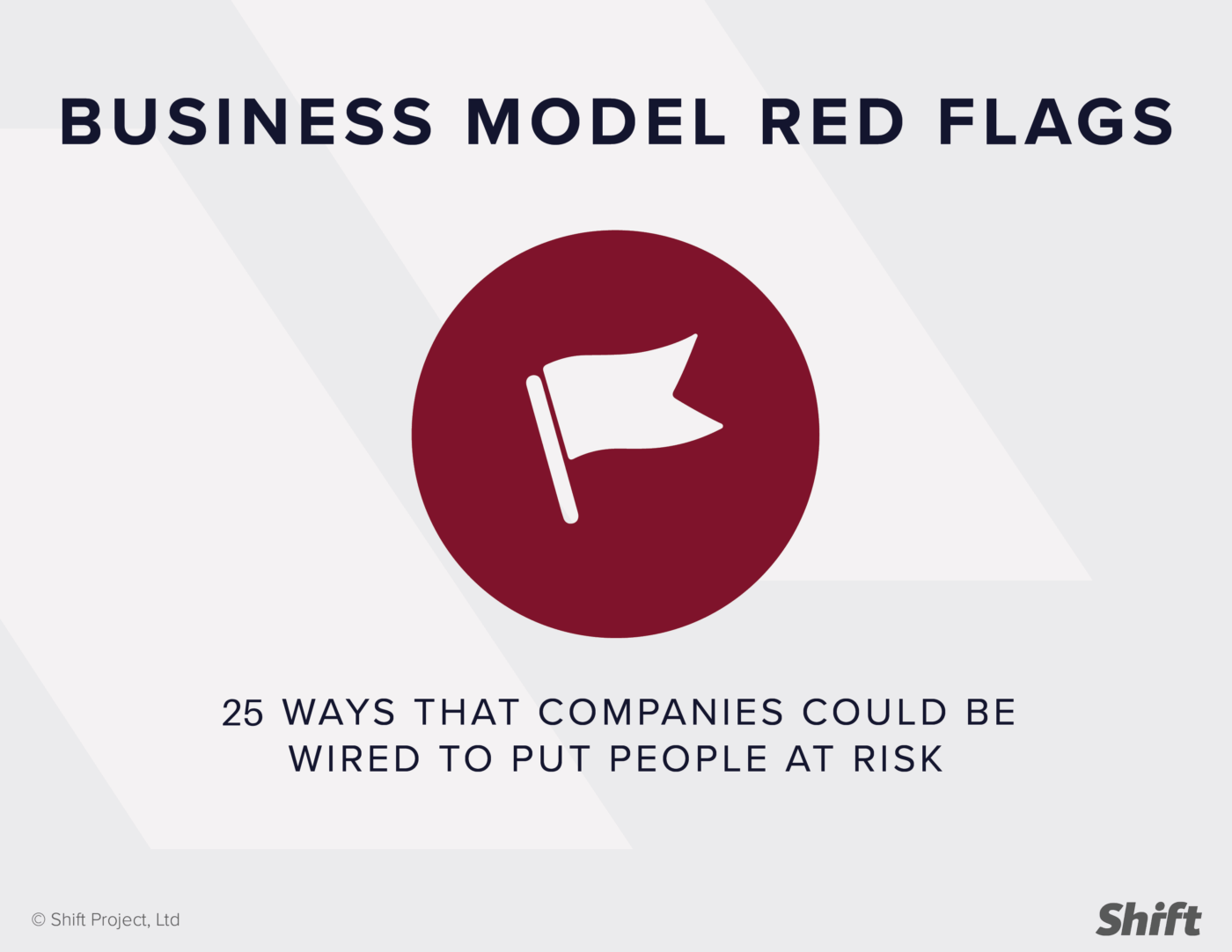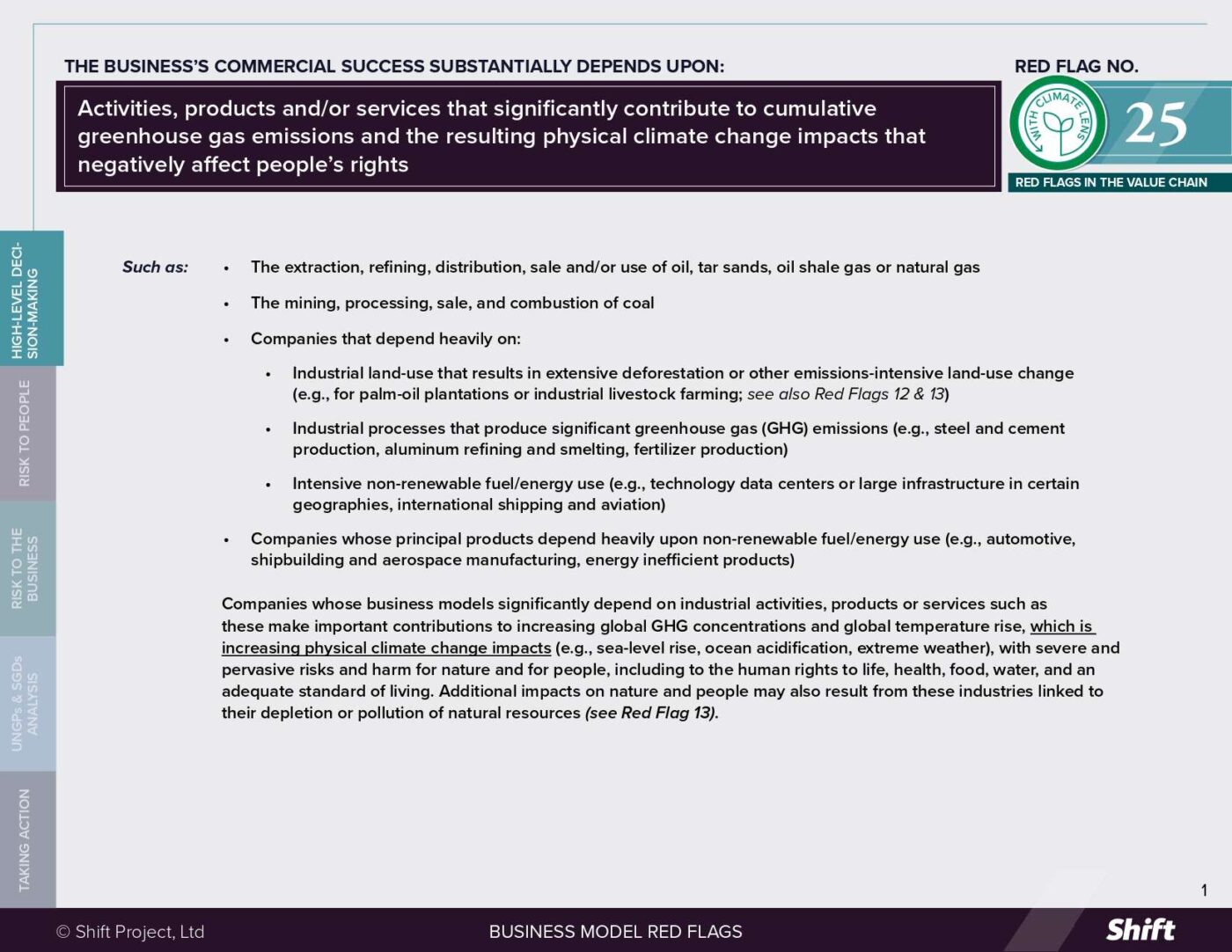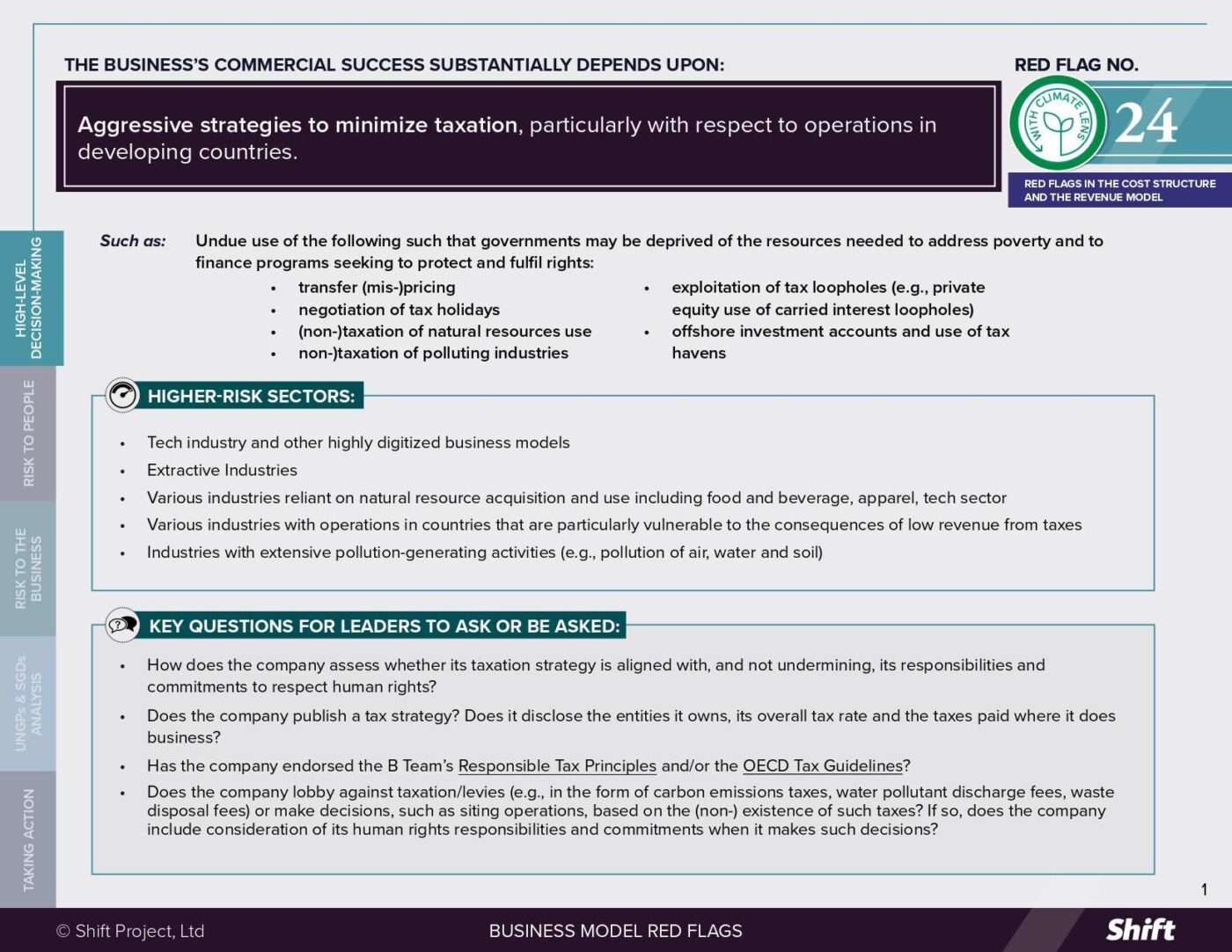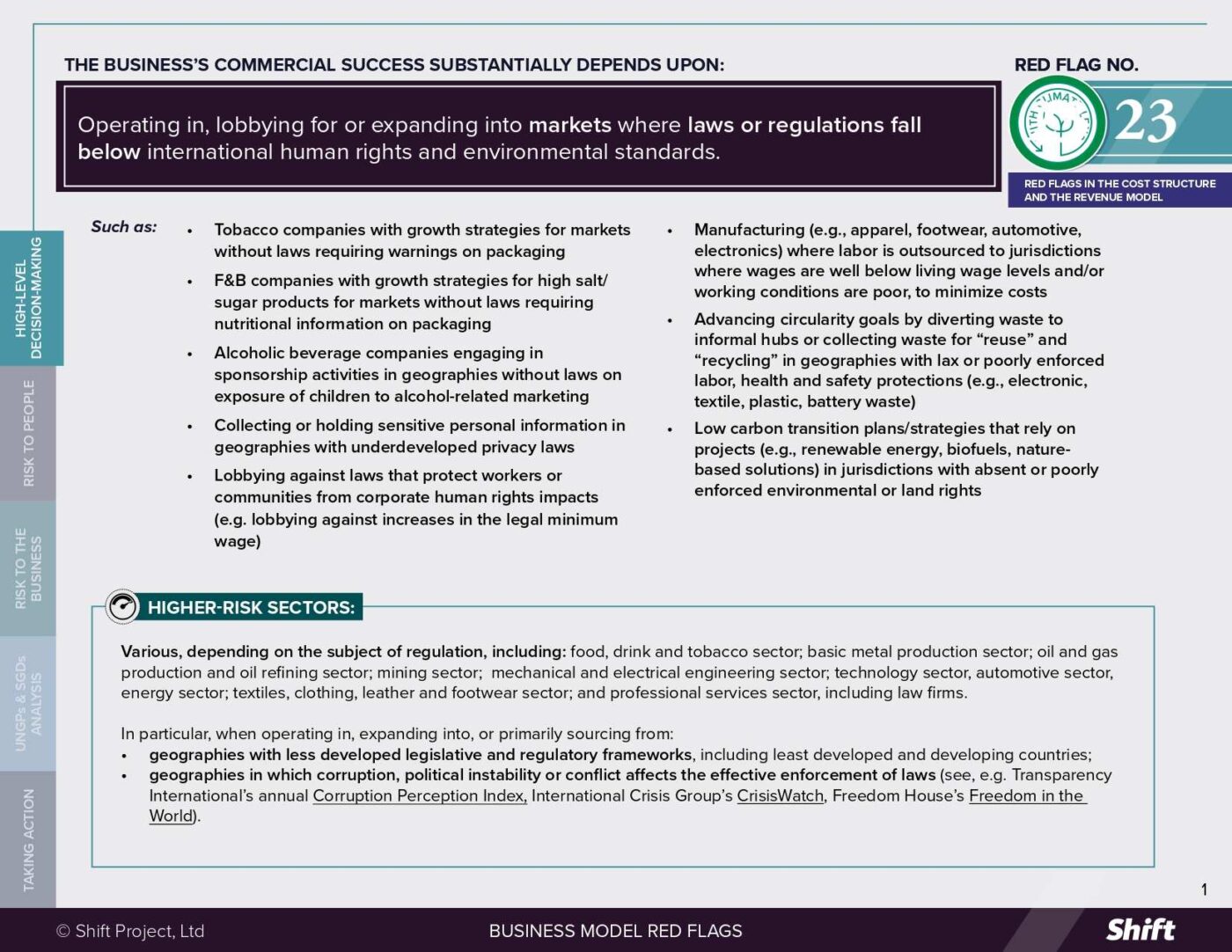RED FLAG # 2
Offering high-speed delivery such that it places pressure on warehouse workers and logistics workers in the “last mile”.
For Example
- Retailers offering free or low-priced express delivery to consumers in ways that place unreasonable time or wage pressure on logistics workers
- Logistics providers that rely on low wages and precarious labor
Higher-Risk Sectors
- Online retailers
- Logistics Providers
Questions for Leaders
- How does the company understand what the true costs of delivery are once decent working conditions are factored in, and where those costs are reflected in the company’s pricing model?
- (Retailers) Does the company know whether it incentivizes consumers to ask for extremely short delivery times, without informing them of the potential decent work implications?
- (Retailers) How does the company know whether its model leads in practice to logistics providers placing unreasonable time or wage pressures on individual workers?
How to use this resource. ( Click on the “+” sign to expand each section. You can use the side menu to return to the full list of red flags, download this Red Flag as a PDF or share this resource. )
Understanding Risks and Opportunities
Risks to People
- Risks to people arise when the business models of retailers or logistics companies do not appropriately factor in the human cost of delivery. Labor cost is the most significant cost within the “last mile” (the movement of goods from a transportation hub to the final delivery destination), and is the process step on which logistics providers often focus to gain competitive advantage (McKinsey & Company 2016).
- In many cases, consumers do not wish to pay for delivery, but at the same time assume that retailers are aware of, and factor in, the human cost of delivery; retailers are often in fact unaware, and pass this cost on to the logistics providers. In turn, logistics providers – incentivized to compete on price and speed of delivery – frequently pass the human cost of delivery onto workers.
- Pressure on Wages and Conditions: Where retailers and logistics companies compete on delivery costs, “final mile” workers, as well as workers in warehouses, have faced below living wages, charges for missing work and denial of holiday and sick pay (Right to enjoy just and favorable conditions of work). The gig economy has been embraced by the logistics sector; human rights impacts can arise where the gig economy intersects with vulnerable workers, and particularly where companies classify workers as self-employed to avoid employer responsibilities and costs and/ or are denied the right to bargain collectively (Right to enjoy just and favorable conditions of work, including equal remuneration for work of equal value; Right to an adequate standard of living (through decent remuneration); Right to join trade unions and the right to strike).
- Risk of Injuries and to Health: Drivers and cycle couriers can face increased risk of crashes due to pressures to deliver more goods, faster, with resulting risks to their health and lives. The effect is exacerbated where retailers engaging independent delivery drivers decline financial responsibility associated with crashes, despite exercising control over factors such as destinations, deadlines and routes. In 2018 the Guardian reported that a UK driver missed three medical specialist appointments to avoid GBP150 daily penalties for missing work, and later collapsed at the wheel and died. (Right to life; Right to health; Right to an adequate standard of living).
- Pressure on Family Life: As retailers offer more and faster delivery options, including late night delivery, workers can see a reduction in time spent with family, and often do not see wage conditions reflecting this reality. (Right to family life).
- Vulnerable Workers: Migrant workers can be particularly vulnerable in the logistics sector, especially when working for subcontractors who enter the retail value chain to meet seasonal demands (Right to enjoy favorable conditions of work). Impacts are exacerbated where migrant workers pay fees to recruitment agencies that place them in situations of unsustainable debt, tying them to a particular agency or job. (Right not to be subjected to forced labor).
- Job Impacts from Automation: New technologies and increased automation impacting business models in the delivery sector can lead to large scale displacement of workers. Risk of human rights impacts can arise where this is not executed with planning or support for upskilling or redeployment of workers. (See Red Flag 21 for further information on large scale or rapid automation).
Risks to the Business
- Business Continuity Risks: Same-day and instant delivery is likely to form 15% of the market by 2020 (McKinsey & Company 2016). As the percentage of retail companies’ revenue derived from online sales increases, retailers who have not resolved risks in their business model associated with this red flag face considerable disruption if this leads to work stoppages amongst logistics workers or consumer boycotts. Investing in capacity building by and with logistics providers with respect to worker rights makes business sense.
- Reputational Risks: As logistics workers face overwork and poor pay and conditions to meet cost and speed requirements, risks of impacts that create reputational and ethical challenges for both retailers and logistics companies increase. Investigative articles examining the conditions of logistics workers, naming both logistics companies and retailers, have been increasing in the UK, Germany and other markets. For example, in Germany it was reported that migrant workers from Eastern Europe who were recruited by agencies to deliver parcels for or in the supply chain of large retailers during the Christmas rush, were receiving below minimum wage and not enjoying decent conditions of work.
- Operational Risks: The value chain may become more complex and higher risk from an operational perspective as logistics providers outsource to sub-contractors to meet unreasonable requirements of price or speed.
- Legal Risks: In some cases, logistics companies relying on contract labor are being determined by the courts to in fact have an employment relationship with logistics workers: in June 2018, an employment tribunal in the UK found 65 Hermes Parcelnet couriers to be workers, and not self-employed contractors. Reasons included the fact that workers had limited scope to negotiate their pay and terms of contract.
What the UN guiding principles say
*For an explanation of how companies can be involved in human rights impacts, and their related responsibilities, see here.
Retailers:
- Where a retailer’s own business model facilitates or incentivizes logistics providers to impact the human rights of warehouse and/or logistics workers, it is considered to contribute to the impacts. Where the retailer takes serious steps to avoid facilitating or incentivizing these outcomes, but impacts nevertheless occur in connection with delivery of the company’s products, the retailer may be considered not to have contributed, but to be directly linked to the impact.
Logistics Providers:
- Where logistics providers pay workers below a living wage and deny decent working conditions they cause human rights impacts.
- Where impacts occur at the level of a logistics subcontractor, the logistics provider will at a minimum be directly linked to the impacts; it will contribute to impacts if its business model or practices incentivized or facilitated them.
Possible Contribution to the SDGs
Addressing impacts to people associated with this red flag can contribute to, inter alia:
SDG 8: Decent Work and Economic Growth, in particular: Target 8.8 on protecting, “labor rights and promot[ing] safe and secure working environments for all workers, including migrant workers, in particular women migrants, and those in precarious employment”; and Target 8.7 on eradication of forced labor.
Taking Action
Due Diligence Lines of Inquiry
Retailers:
- What processes do we have in place for identifying the presence and extent of risks to the human rights of workers delivering our products resulting from the demands placed on them? Do we set expectations for logistics providers with regards to working conditions?
- Do we engage with logistics providers on the issue of working conditions for workers delivering our products and seek genuine feedback on whether and how delivery terms and expectations may create unreasonable pressures?
- Do we reward logistics providers for measures that ensure the protection of workers’ rights, or do we, in practice, consider only speed and price?
- Do we engage at the industry level to put in place common measures that avoid retailers competing on delivery terms that place pressure on the human rights of logistics workers?
Logistics Providers:
- How do we assess the true cost of delivery, once decent working conditions are factored in, and how can we integrate this into prices?
- Do we seek genuine feedback from our workers about their experience providing our services, through channels they can trust?
- Do we have in place policies and processes to provide decent working conditions? How do we embed these and track our progress?
- Do we have a channel in place to discuss with retailers the human costs of delivery, and retailer pressures that impact workers/working conditions? Can we create one either individually or in concert with industry peers?
Mitigation Examples
*Mitigation examples are current or historical examples for reference, but do not offer insight into their relative maturity or effectiveness.
Logistics Providers :
- Engagement Beyond Employees: Following the death of a driver, DPD conducted a strategic operational review, including a consultation with UK drivers, obtained independent, external advice and rolled out a driver code in 2018. DPD UK introduced new self-employed worker contracts aimed at providing “all drivers the flexibility to move between different employment statuses including employed, Owner Driver Workers and Owner Driver Franchisees.” (See further DPD CSR Report 2018, p. 19).
- Royal Mail: Engages the government in relation to better labor standards across the industry.
- Ombudsperson System: Hermes Parcelnet has adopted a Code of Conduct and developed a Social Compliance Model to underpin the embedding of its Code. As part of this, the company created a Panel to hear courier complaints and appointed a Business and Human Rights Ombudsperson who provides a) recommendations to the Panel on remedy for human rights-related complaints and b) suggestions to the audit committee for strengthening the company’s policies and processes.
Retailers:
here is limited information on good practices at the retailer- level with respect to this red flag, particularly with respect to addressing the effect of retailers’ own practices.
- UK Logistics Initiative: A small group of retailers joined together to address working conditions at their final mile delivery logistics partners. This has involved using collective leverage to open up a conversation between logistics providers and a credible independent third party and a workshop with retailers to discuss the findings of those conversations, to develop a common understanding of the risks to people and to take action individually and where appropriate collectively. This is an informal group, convened by Shift in partnership with the British Retail Consortium.
- Capacity Building: Marks and Spencer conducts risk assessments and audits of logistics providers. The company also brought logistics providers (amongst other suppliers) to its Modern Slavery and Human Rights Conference, offering capacity building with respect to modern slavery, including a toolkit for suppliers, and a reminder of M&S expectations (See M&S 2017 Human Rights Report, p.21).
Alternative Models
Logistics Providers: In a groundbreaking step for the gig economy, logistics provider Hermes Parcelnet engaged in a recognition deal with GMB Union pursuant to which self-employed workers can choose to become “self-employed plus” and receive benefits such as holiday pay, negotiated pay rates and union representation. In exchange, workers agreed to follow delivery routes specified by Hermes Parcelnet rather than delivering parcels in any order. (See IHRB 2019 for more information).
Other Tools and Resources
- McKinsey & Company (2016) Parcel delivery: The future of last mile – Travel, Transport and Logistics.
- BSR (undated), 10 Human Rights Priorities for the Transport and Logistics Sector.
Case Example(s):
- In 2018 the Guardian reported that a UK driver missed three medical specialist appointments to avoid GBP150 daily penalties for missing work, and later collapsed at the wheel and died.
- In Germany it was reported that migrant workers from Eastern Europe who were recruited by agencies to deliver parcels for or in the supply chain of large retailers during the Christmas rush, were receiving below minimum wage and not enjoying decent conditions of work.
- Shift partnered with the Behavioral Science Group at Warwick Business School to see if behavioral science could suggest some ways to “nudge” consumers towards longer delivery windows that could reduce pressures on couriers. See, Adding Human Rights to the Shopping Cart (2020).
Citation of research papers and other resources does not constitute an endorsement by Shift of their conclusions.

 Business Model Red Flags
Business Model Red Flags  Tool for Indicator Design
Tool for Indicator Design 